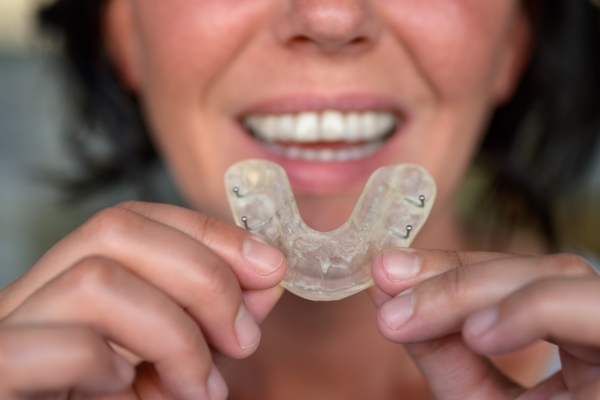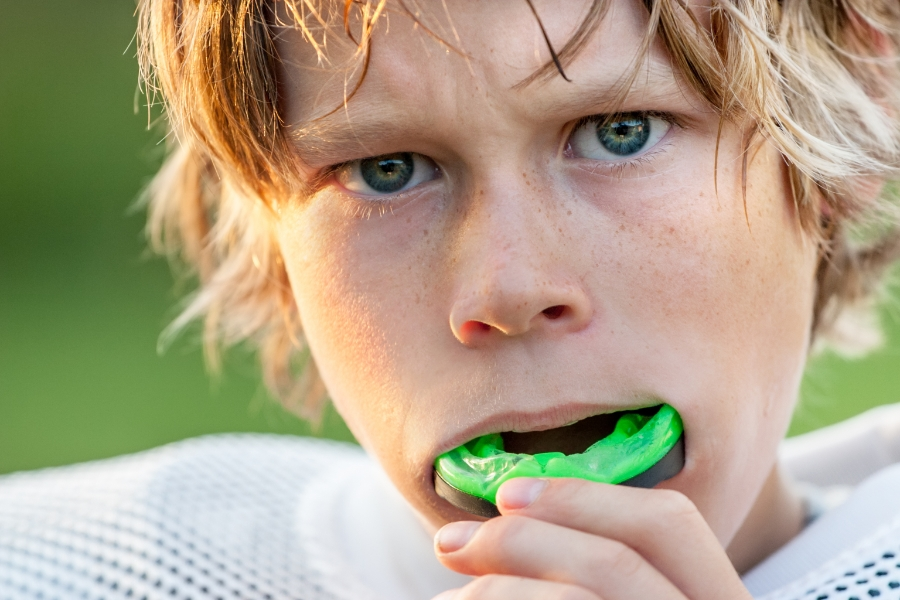Mouth guards are actually really important for safety and protection for a lot of athletes, both professional and amateur ones. In a number of sports environments, even kids and teenagers could need this kind of protective gear. More than 5 million teeth are avulsed, displaced from their socket, each year, many during sports activities.While there are plenty of easily accessible universal-fit choices from stores, the majority of dentists advise getting a custom-fit model directly from the patient’s dentist or from online providers. The sports medicine staff continues to see orofacial and dental trauma on a regular basis. All sports have some risk for dental injury, but “contact sports” presumably incur more risk. Playing contact sports has various advantages for mouth guard wearers, and the best way to go about it is by getting a custom mouthguard.
Top 5 Sports That Require Mouthguards

If you’re a professional athlete or just play any of the mentioned sports for fun or as a hobby, then you might be at a high risk for dental injuries. We’ve talked about the top 5 sports that require mouthguards, however it’s better to be safe with any type of sports by wearing a mouthguard. Here are some of the sports listed that require a mouthguard:
- Boxing: Boxing is going to be on top of the list where the chances of you getting punched in the face are pretty high. This can easily damage your teeth and jaws. A mouthguard for boxing is pretty important because it protects your teeth from getting knocked out, your jaw from breaking, and your lips from getting cut. It also helps absorb some of the impact, which can prevent serious head injuries.
- American Football: American football involves a lot of hard hits and tackles. You wear a mouthguard to protect your teeth, lips, and jaw from getting hurt during these collisions. Mouthguards also help cushion the blows to your head, reducing the chances of getting a concussion.
- Ice Hockey: In ice hockey, you’ll be moving fast and often crashing into each other, the puck, and the boards. Mouthguards are important because they protect your teeth and jaw from getting damaged. They also help prevent cuts to your lips and tongue from sticks and pucks.
- Rugby: Rugby is a rough sport with lots of tackles and physical contact. Mouthguards for rugby are essential because they protect your teeth and jaw from getting hurt. They also help reduce the risk of concussions by cushioning the impact of hits to your head.
- Skateboarding: When skateboarding, you can fall and hit your face on the ground, ramps, or other obstacles. Wearing a mouthguard is important because it protects your teeth from getting chipped or knocked out during falls. It also helps prevent injuries to your lips and gums. Even though it’s not a contact sport, the risk of facial injuries from falls makes a mouthguard a smart choice for skateboarders.
Common Dental Injuries in Sports
Let’s talk about some of the common injuries that you might get when playing different types of sports, whether as a professional athlete or just as an amateur. Common dental injuries in sports include tooth (crown) fractures; tooth intrusion, extrusion, and avulsion; and temporomandibular joint dislocation.In these cases like tooth fractures, where the visible part of the tooth breaks; tooth intrusion, where the tooth will be pushed back into the gum; and tooth extrusion, where the tooth will be partially dislodged but still attached. Tooth avulsion will be a severe injury where the tooth will be completely knocked out. Athletes will also experience temporomandibular joint (TMJ) dislocation, causing pain and difficulty in moving the jaw. So, it’s really important that you get a mouthguard and start wearing it before playing sports.
What Are Different Types of Mouthguards For Athletes
Let’s go ahead and discuss some of the mouthguard options for athletes that are available in the market. These options range from stock mouthguards to boil and bite mouthguards and lastly custom-made mouthguards specifically designed for your needs.
Stock Mouthguards
Stock mouthguards are pre-formed and ready to wear right out of the package. They are the most basic type of mouthguard and are usually the least expensive. However, they often do not fit very well because they are made in standard sizes. This can make them uncomfortable and less effective at protecting your teeth and mouth.
- Often uncomfortable
- Can affect your breathing
- Can make it difficult for you to speak clearly
- Offer less protection from dental injuries
Boil and Bite Mouthguards
Boil and bite mouthguards come in a preformed shape but can be customized to fit your mouth. To use them, you soften the mouthguard in boiling water, then bite into it while it’s still soft. This molds the mouthguard to the shape of your teeth, providing a better fit than stock mouthguards. They offer a balance between cost and customization.
- They are softened in boiling water for shaping.
- Biting into the softened guard molds it to your teeth.
- Provide a better fit than stock mouthguards.
- Can hinder clear speech.
- Offer less dental protection.
Custom-Made Mouthguards

Custom-made mouthguards are created specifically for your mouth by a dentist. This type requires a visit to the dentist, where an impression of your teeth is taken. The mouthguard is then made to match this impression, ensuring the best possible fit and protection. Custom-made mouthguards are the most expensive option but offer the highest level of comfort and effectiveness. You can also get custom mouthguards online from providers like ALIGNERCO. It’s a great option for individuals with braces or other orthodontic appliances, it can be difficult to find a mouthguard that fits properly from over-the-counter options.
- Offer superior protection compared to stock or boil and bite mouthguards.
- Highly effective in preventing dental injuries.
- Do not interfere with breathing.
- Allow clear speech.
Why Mouthguards Are Important for Athletes
Let’s talk about why mouthguards are so important for every athlete. There’s a number of reasons listed below.
Protects Teeth and Jaw Injuries
You should wear a mouthguard because it prevents your teeth from getting knocked out or broken during high-contact sports. A mouthguard provides a barrier between your teeth and any impact, ensuring that even if you get hit in the mouth, your teeth stay intact. Therefore, wearing a mouthguard is crucial for keeping your teeth safe.
Mouthguards also cushion the impact of hits to your face which reduces the risk of broken or dislocated jaws. By absorbing all the force, they will minimize damage to your jawbone. This is why wearing a mouthguard can prevent painful and serious jaw injuries that could require long recovery periods.
Reduces Cuts, Bruises, and Concussions
You should wear a mouthguard because it shields the soft tissues inside your mouth from cuts and bruises caused by blows or collisions. A mouthguard protects your lips, cheeks, and tongue from getting injured during intense physical activities. Hence, wearing a mouthguard reduces the risk of painful and inconvenient injuries that can affect your ability to speak and eat.
Mouthguards can also absorb some of the shock from hits to your head, helping to lower the risk of concussions. By reducing the force transmitted to your skull, they offer some protection to your brain. Therefore, wearing a mouthguard is essential for sports with a high risk of head injuries.
Protects Braces and Enhance Performance Confidence
If you have braces, retainers, or other dental work, you should wear a mouthguard because it provides an essential layer of protection. A mouthguard prevents damage to your dental appliances and protects your mouth from the sharp edges of braces. This is why wearing a mouthguard is important for athletes with dental work.
Knowing that your teeth and mouth are protected, you can play more confidently and aggressively. This mental assurance can improve your overall performance and focus during the game. Hence, wearing a mouthguard allows you to push your limits without fear of dental injuries.
What’s The Best Type Of Mouth Guards?

The best mouth guard for athletes is a custom mouth guard. These mouthguards are specifically customized since your dentist may modify their thickness based on how much you grind and clench your teeth or specifically design them for sports activities. They also fit your mouth precisely the first time, requiring no modifications. Depending on the intended use, custom mouthguards are constructed differently for sports or overnight teeth grinding. While universal-fit mouth guards are relatively inexpensive and easy to buy, they do not offer the benefits and protection of a custom-fit design.
If you wanna continue playing sports without any injuries, it’s highly recommended that you get a custom mouth guard made from a dentist or order it online from providers like ALIGNERCO. They offer custom mouth guards for only $125 and you don’t need to wait for dental appointments and spend a lot to protect your teeth.
Final Thoughts
You should always wear a mouthguard if you play sports that involve physical contact or risk of falls. This is because mouthguards protect your teeth, jaw, and mouth from serious injuries. They also help reduce the risk of concussions. Whether you play boxing, football, hockey, rugby, or skateboard, a mouthguard is essential for keeping you safe and allowing you to perform your best without worrying about dental injuries.
FAQs
1. How often should I clean my night guard?
It’s important to clean your night guard after each use to maintain hygiene and functionality. This prevents the growth of bacteria that can cause bad breath and other oral health issues.
2. What is the best way to clean a night guard?
The best way to clean your night guard is to use a soft toothbrush and non-abrasive soap or toothpaste and gently brush the guard. To get rid of any residue, always give it a quick rinse under cool running water afterward.
3. Is it possible to clean my night guard with mouthwash?
Yes, you can assist in disinfecting your night guard by soaking it in non-alcoholic mouthwash for roughly ten minutes. Make sure you give it a good rinse afterwards to get rid of any mouthwash taste.
4. How can I get rid of stubborn stains off my night guard?
To loosen up tough stains, immerse the night guard in white vinegar for half an hour. Rinse it, then soak it in hydrogen peroxide for an additional thirty minutes to give it an even deeper clean and brighter appearance.
